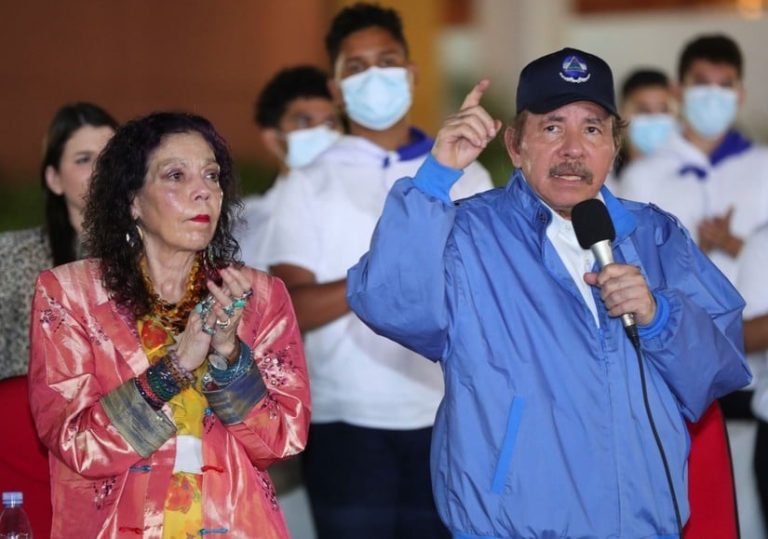30 de noviembre 2021

Children of Exile: The Births “Sowing Hope” in the Camp of Nicaraguan Farmers

PUBLICIDAD 1M
PUBLICIDAD 4D
PUBLICIDAD 5D
The decision to abandon the OAS reaffirms his growing status as an international pariah.

Daniel Ortega and Rosario Murillo. Photo: Government
The November 7 electoral farce had, among its few real results, a greater and justified isolation of the Nicaraguan dictatorship. A large number of democracies, including Costa Rica, condemned and disavowed its legitimacy. The United States and the European Union imposed or hardened sanctions on various representatives of the ruling leadership.
Five days later the General Assembly of the Organization of American States (OAS), by an overwhelming majority, approved a resolution that rejected the election results and instructed its General Secretariat to assess the situation in the country before November 30. What will follow, remains to be seen.
Daniel Ortega, far from seeking other ways, even if they are cosmetic, that send a positive message to his people and the international community, has chosen to deliberately increase his status as an international pariah. That is what his decision to abandon the OAS, which his foreign minister, Denis Moncada, called “an instrument of interference and intervention” reflects. It is a process that, according to the organization’s Charter, will take two years, but it has already begun and will increase the isolation of the regime and, unfortunately, also of the nation.
Without a doubt, the dictatorship wants to be left virtually alone to do what it wants without being held accountable. It only has the dubious company, as allies, of Cuba, Venezuela, Russia, and Iran. However, it also still has the possibility to access loans from multilateral financial organizations, although that could be hampered very soon.
The departure from the OAS was crudely orchestrated to make it seem (to whom?) as the result of national consensus. On November 17th the National Assembly, dominated by the ruling party, approved a resolution calling on the Executive to undertake that action. The request was joined, in a typically Stalinist alignment, by the Supreme Court and the Electoral Council, also appendages of the ruling family. On the 19th, Moncada, addressed a letter to the Secretary General, communicating the decision, which was also announced from a stage in Managua.
This show has coincided with another event that may explain it partly: On November 23rd, the Inter-American Court of Human Rights declared Nicaragua in “contempt” for refusing to comply with the provisional protection measures for 21 political prisoners, including seven presidential candidates, adopted by that court, based in San José, Costa Rica.
In its resolution, the Court classifies the breach as an act “contrary to the international principle that imposes on the State the duty to comply with its treaty obligations in good faith, as well as a breach of the duty to inform” the court. In addition, it announced that it will submit this unprecedented act to the OAS, which will probably lead to some type of sanctions.
When a regime, whatever its nature, decides, as one of its political lines, to marginalize itself from other countries and organizations, it declares, implicitly, not only its disdain for international law and other universal standards of conduct, always a source to modulate their behavior, but also for their own people.
These “thuggish” stands, disguised as dignity, will never replace the need for good governance, respect for rights and freedoms, and to be accountable to citizens. It is one more reason for the OAS and the Inter-American System as a whole to redouble its interest in the tragic situation in Nicaragua. Likewise, to take drastic measures in compliance with the provisions of the Inter-American Democratic Charter and support as much as possible the internal sectors that, immersed in the repression and with enormous limitations, continue to struggle for freedom.
This article was originally published in Spanish in Confidencial and translated by Havana Times
PUBLICIDAD 3M
Diario costarricense, fundado en 1946. Su primera versión electrónica (nación.com) se publicó en abril de 1995. Desde junio de 2015 implementa un sistema de suscripción digital.
PUBLICIDAD 3D